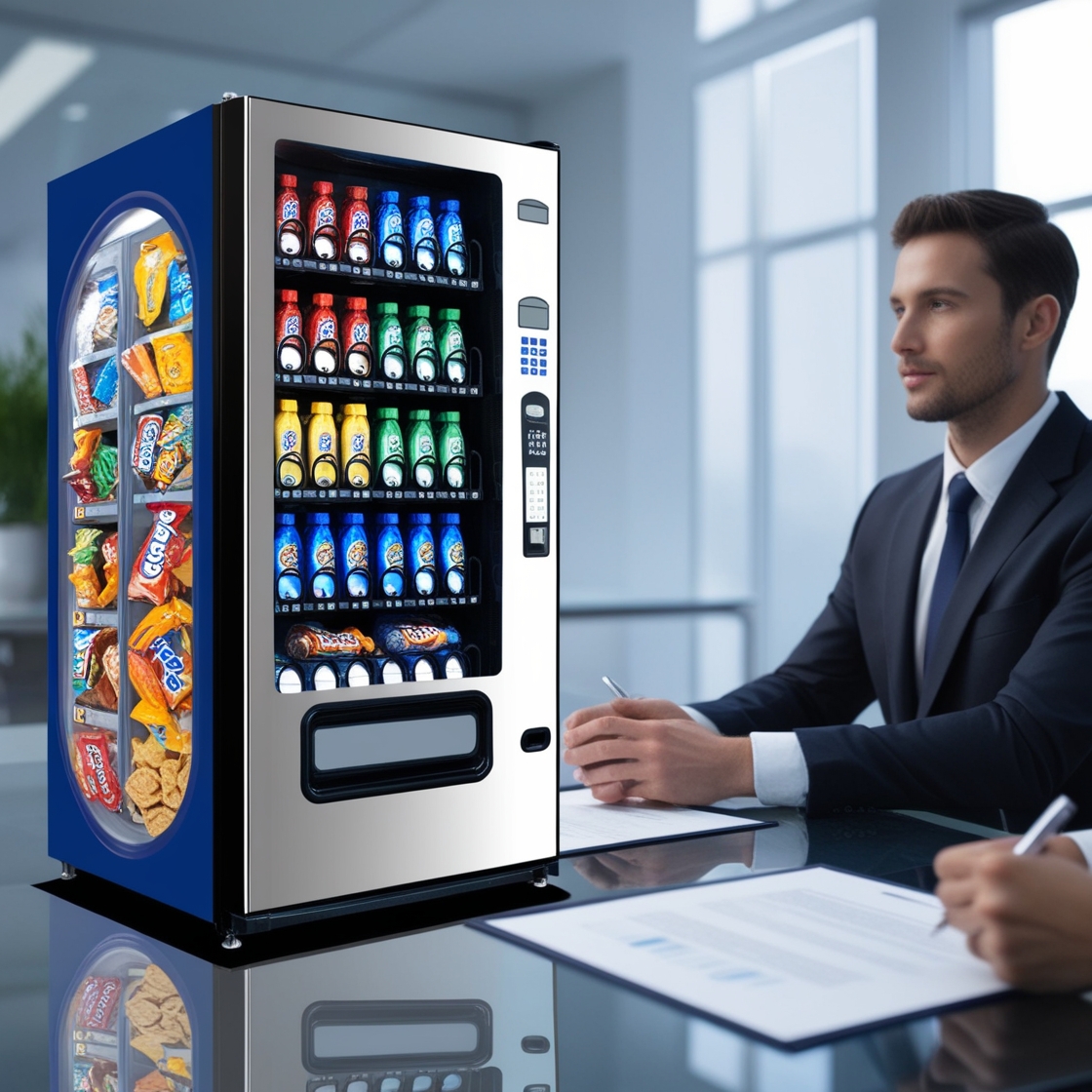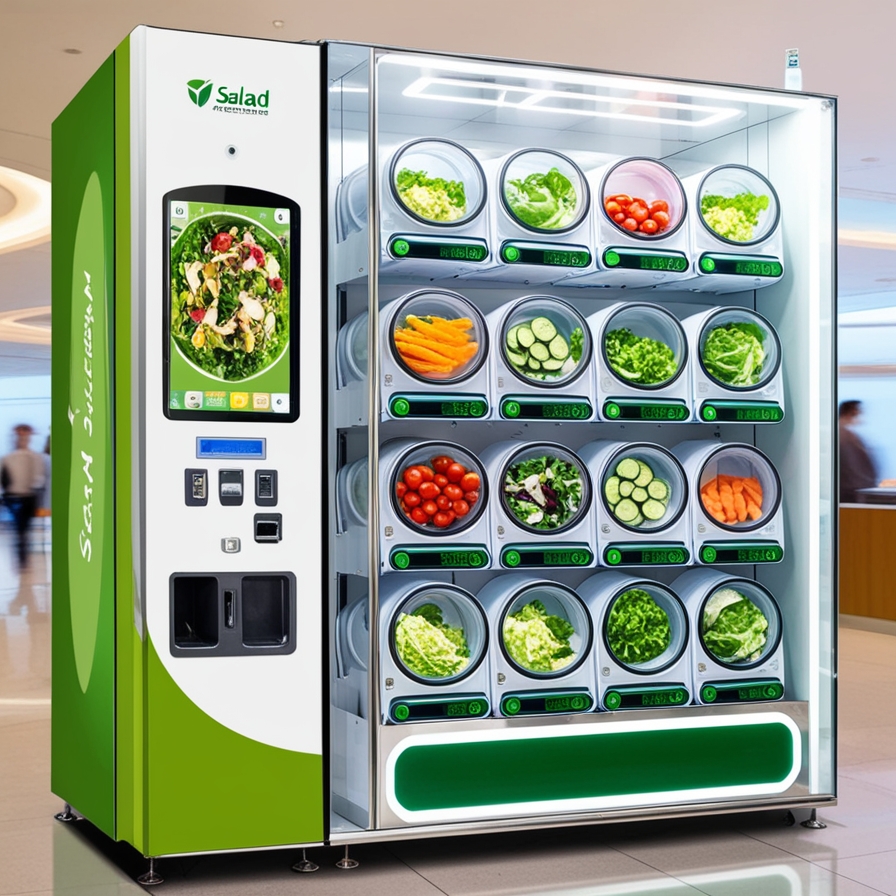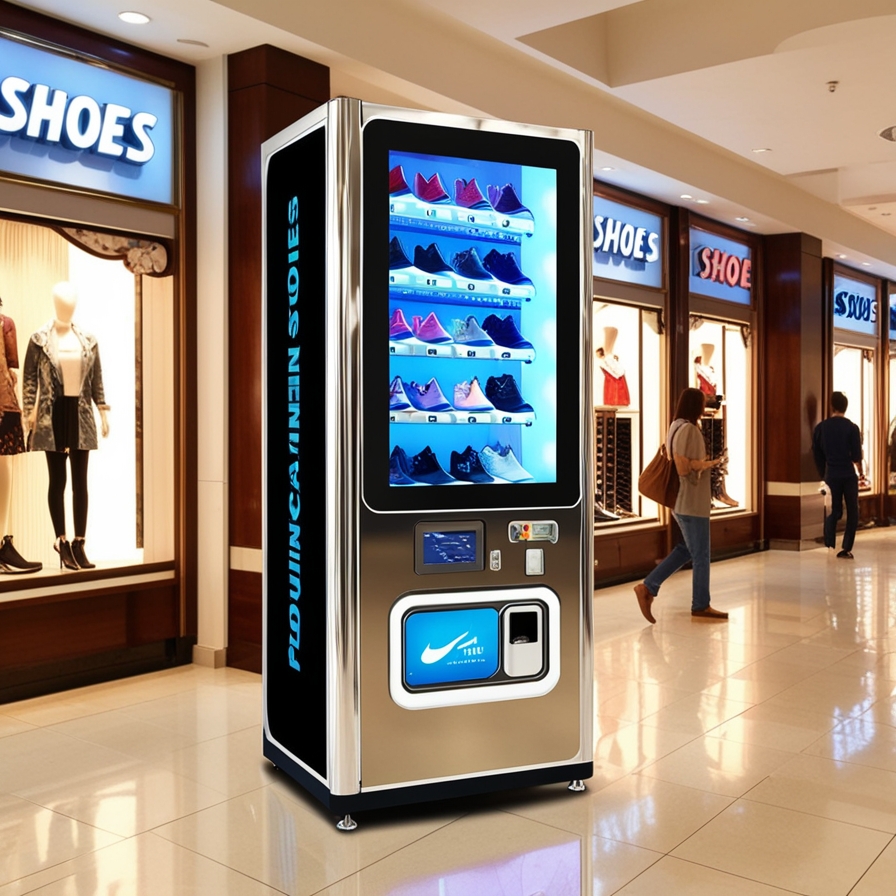Unlocking the Essentials of Vending Machine Contracts
Navigating the complexities of vending machine contracts is crucial for ensuring profitable and smooth operations. Whether you are a startup venturing into the vending business or a seasoned operator looking to optimize your service, understanding these agreements can greatly influence your success.
In this ultimate guide, we will delve into the key elements of vending machine contracts, from negotiating terms to understanding legal implications.
Our goal is to equip you with the knowledge and confidence to manage these contracts effectively, ensuring a steady path to profitability and operational excellence.
Let’s get started on securing your vending business’s future.
Understanding a Vending Machine Contract
Defining a Vending Machine Contract A vending machine contract
is a formal agreement between a vending machine owner (service provider) and a client, such as a business or facility manager, where vending services are to be provided.
This contract outlines the specifics of the service delivery, including the placement of machines, types of products to be dispensed, payment terms, maintenance responsibilities, and the duration of the service period.
The Importance of Vending Machine Contracts for Service Providers and Clients
Understanding and carefully negotiating the terms of a vending machine contract is crucial for both parties involved.
For service providers, it secures a location for their machines and guarantees a clear framework for revenue sharing and other financial aspects, which are essential for business stability and growth.
On the other hand, clients benefit from the assurance of quality service, reliable machine maintenance, and a consistent supply of products tailored to the needs of their customers or employees.
Overall, a well-crafted vending machine contract fosters a profitable and harmonious partnership that ensures smooth operations and satisfaction on both sides.
Exploring a Sample Vending Machine Contract
Components of a Vending Machine Contract
A sample vending machine contract typically includes several key components that outline the operational and financial framework of the agreement.
These components cover areas such as the type and number of vending machines, specific locations for installation, types of products to be offered, and the pricing structure.
Additionally, it specifies the terms of service, including installation, refilling, maintenance, and repair responsibilities, as well as how often these services will be performed.
Key Clauses and Terms to Consider
When reviewing a sample vending machine contract, it’s important to pay attention to several common clauses that can significantly impact the relationship between the service provider and the client. These include:
- Revenue Sharing: Details on how the generated income will be divided between the vending machine owner and the location provider.
- Duration and Renewal: Specifies the length of the contract and the terms under which it can be renewed.
- Exclusivity: Whether the client is obligated to only use the service provider’s machines at their location.
- Termination: Conditions under which either party can terminate the contract and any penalties involved.
- Liability and Insurance: Outlines who is responsible in case of damage or loss related to the vending machines and the products.
Understanding these clauses helps both parties to negotiate terms that are fair and ensure a mutually beneficial relationship.
Download a Vending Machine Contract PDF
Accessing a Sample Contract in PDF Format
For those looking to delve deeper into the specifics or draft their own agreements, accessing a vending machine contract PDF can be invaluable. We provide a downloadable PDF version of a sample vending machine contract, which you can use as a template or reference to understand the typical structure and clauses involved in these agreements.
Advantages of a PDF Vending Machine Contract
Having the contract in PDF format offers several benefits:
- Portability and Accessibility: PDFs are easily accessible on various devices, allowing you to review the document on-the-go, whether you’re at the office or out in the field.
- Security: PDFs can be encrypted and password protected, ensuring that sensitive information remains secure from unauthorized access.
- Consistency: This format maintains the formatting of the document, ensuring that the contract remains unchanged regardless of the device or software it’s viewed on.
- Ease of Sharing: PDFs can be easily shared with stakeholders, legal advisors, or business partners for review and collaboration without compatibility issues.
This downloadable PDF serves as a crucial tool for both prospective vending service providers and clients, ensuring clarity and alignment in contractual agreements.
Understanding Your Vending Machine Agreement
Detailed Breakdown of a Vending Machine Agreement
A vending machine agreement dives deep into specifics that are particularly tailored to the vending industry.
This includes detailed stipulations about the types and conditions of the vending machines, product selection and replenishment, financial arrangements such as leasing or revenue sharing, and precise service and maintenance schedules.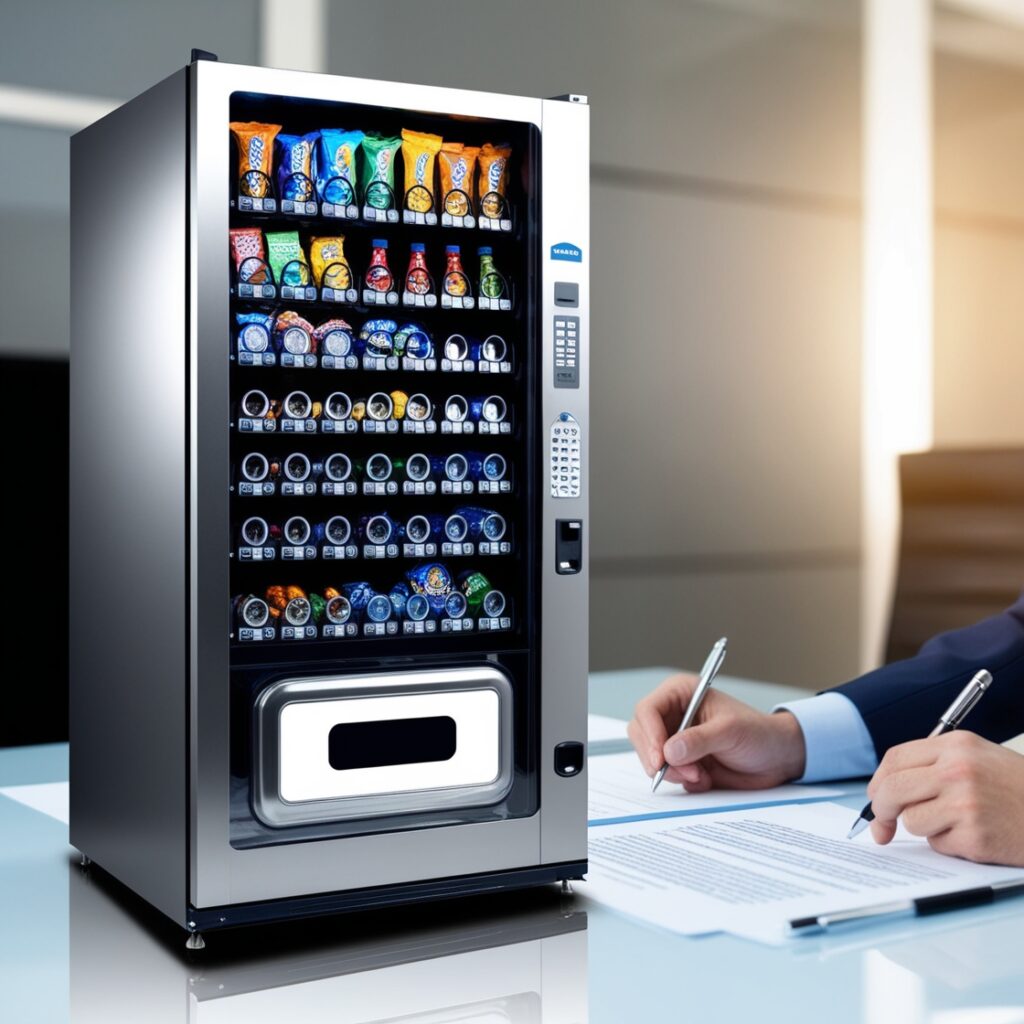
Each part of the agreement is designed to address the unique needs and challenges of vending operations, ensuring that both the provider and the client have a clear understanding of their responsibilities and expectations.
Distinguishing Features from General Contracts
Vending machine agreements differ from general business contracts in several key aspects:
- Location Specificity: Unlike general contracts, vending agreements must specify exact locations for machine installation, which can affect terms depending on foot traffic, security, and accessibility.
- Operational Details: These contracts often include clauses on machine functionality, uptime requirements, and emergency response for repairs, which are not commonly found in standard business agreements.
- Product Management: Detailed arrangements about who selects the products, restocking frequencies, and handling of expired or unsold products are crucial.
- Compliance and Regulations: Vending agreements must also adhere to specific health and safety regulations, which vary by region and the type of products sold (e.g., food, beverages, electronics).
Understanding these specifics is vital for ensuring that the vending machine agreement is comprehensive and aligns with the operational standards and goals of both parties involved.
This detailed attention helps mitigate risks and enhances the profitability and smooth running of vending operations.
How to Get a Vending Machine Contract
Research and Identify Opportunities
Securing a profitable vending machine contract begins with thorough research to identify potential locations where vending services are not just needed but can thrive.
Focus on high-traffic areas such as office buildings, educational institutions, fitness centers, and hospitals.
Understanding the demographics and foot traffic patterns of these locations will help you tailor your services to meet the specific needs of potential clients, enhancing the appeal of your offering.
Prepare Your Proposal
Creating a compelling proposal is crucial in illustrating the benefits of your vending services.
Highlight how your machines can provide convenient, around-the-clock access to snacks and drinks, thereby meeting the needs of busy students, employees, or customers.
Customize each proposal to address the specific benefits for the potential client, such as increased productivity for offices or improved student satisfaction in schools.
Include testimonials, case studies, and clear, attractive visuals of the vending machines and product selections.
Build Relationships
Establishing and maintaining strong relationships with property managers and business owners is essential for both acquiring and retaining vending machine contracts.
Attend local business events, participate in trade shows, and join relevant associations to network effectively.
Always follow up with contacts, provide excellent customer service, and keep communication lines open to ensure ongoing positive interactions.
Negotiate Terms
When negotiating the terms of the vending machine contract, focus on creating a win-win situation.
Discuss revenue sharing models that are fair and appealing to the client.
Clearly define maintenance responsibilities to ensure the machines are always operational and presentable.
Be flexible but firm on contract duration to protect both parties’ interests while allowing for adjustments as business needs evolve.
Close the Deal
To finalize the contract, ensure that all terms are clearly understood and agreed upon by both parties. Walk through the contract with the client to address any concerns and clarify any points of confusion.
Once the contract is signed, continue to engage with the client to maintain a strong partnership, and ensure you follow through with all the agreed terms.
This proactive engagement will help in renewing the contract and possibly expanding your vending services to other locations the client manages.
How to Secure Vending Contracts
Strategies for Securing Vending Contracts
Securing vending contracts requires a blend of strategic planning, strong presentation skills, and effective networking. Here’s how you can increase your chances of winning these contracts:
Networking to Find Opportunitie
Networking remains one of the most effective ways to learn about new vending opportunities before they become widely known.
Join local business associations, chambers of commerce, and other groups where business owners and property managers are likely to gather.
Regular attendance and participation in these groups can lead to valuable insider knowledge and personal recommendations.
Presentation of Your Vending Business
When you have the opportunity to pitch your vending services, your presentation must be polished and professional.
Highlight the reliability of your machines, the variety and quality of the products offered, and your commitment to customer service.
Use clear, engaging visuals and data to demonstrate how your vending machines can benefit their location.
Don’t Forget to Read
Where Can I Put a Vending Machine for Free? Best Locations Uncovered
Tailor each presentation to address the specific needs of the business or venue you’re targeting, showing that you understand and can meet their unique requirements.
Mastering the Bidding Process
The bidding process for vending contracts can be competitive, so it’s essential to prepare thoroughly.
Understand the typical requirements set by larger entities, like schools or government offices, and ensure your bid is compliant with all their criteria.
Offer clear, competitive pricing and detail the value you bring over competitors, such as better service terms or superior machine technology.
Be transparent about your business practices and provide all requested documentation promptly to build trust and credibility.
Effective Follow-Up
After submitting your proposal or completing a presentation, follow up diligently.
A timely follow-up not only shows your professionalism but also your enthusiasm and commitment to providing value.
It gives you a chance to address any further questions the potential client might have and to reinforce the strengths of your proposal.
By implementing these tips and strategies, you can enhance your ability to secure lucrative vending contracts, thus expanding your business and increasing its profitability.
Learning from Vending Contract Examples
Studying Real-Life Successes
Examining real-life examples of successful vending contracts can provide invaluable insights for both new and experienced vending operators.
Here, we’ll discuss a couple of case studies that highlight effective strategies and common pitfalls to avoid.
Case Study 1: High School Vending Services
In this example, a vending service provider secured a long-term contract with a large high school. The key to their success was their detailed approach to meeting the specific needs of the school.
They offered a range of healthy snack options, which complied with national nutritional guidelines, and included technology in their machines for cashless payments, making them highly popular among tech-savvy students.
The contract was successful because the provider focused on aligning their offerings with the client’s requirements and the users’ preferences.
Case Study 2: Corporate Office Vending Solutions
Another successful case involved a vending service provider who secured a contract with a corporate office complex by offering customized solutions.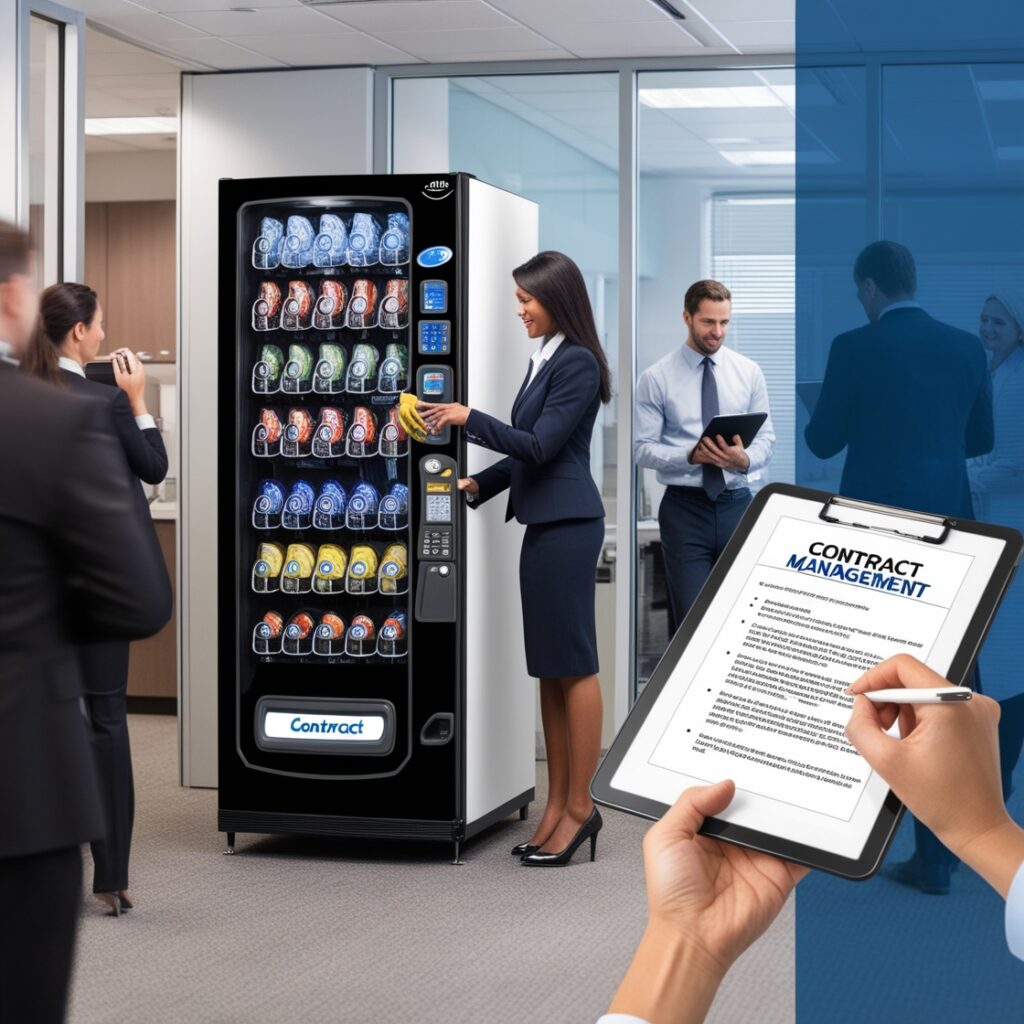
The provider included premium coffee machines and a variety of gourmet and organic snack options, catering to the tastes and health preferences of office workers.
They also ensured regular maintenance and service updates, which minimized machine downtime and maintained high satisfaction levels among the users.
Analysis of Success Factors
The success of these examples can be attributed to several key factors:
- Client-Specific Customization: Tailoring the product offerings and machine features to fit the specific demographic and preferences of the site.
- Reliability and Service Excellence: Regular and proactive maintenance ensured that machines were always operational, which is crucial in maintaining client and user satisfaction.
- Innovative Solutions: Incorporating modern technology such as cashless payment systems and offering a variety of products, including healthy and gourmet options, set these services apart from competitors.
Avoiding Common Pitfalls
Both examples avoided common pitfalls such as neglecting client needs and failing to adapt to specific site requirements. They maintained flexibility in contract terms, which allowed for adjustments and improvements based on feedback, fostering a positive and responsive relationship with the client.
By learning from these examples, vending service providers can better understand how to craft appealing proposals and manage contracts effectively, leading to sustained success in their vending operations.
Conclusion
Successfully navigating vending machine contracts is essential for ensuring profitable and smooth operations. By focusing on tailored proposals, strategic networking, and clear contract negotiations, vendors can establish mutually beneficial agreements.
Remember, understanding and adapting to the unique needs of each client will set the foundation for a thriving vending business.
Frequently Asked Questions (FAQs)
What should I include in a vending machine contract?
Include details about machine types, locations, product selections, revenue sharing, maintenance responsibilities, and contract duration.
How can I make my vending service proposal stand out?
Tailor your proposal to the specific needs of the client, emphasizing convenience, product variety, and any unique features like cashless payment systems.
What is the best way to find potential vending contract opportunities?
Network within business associations, attend trade shows, and connect with property managers to learn about new locations and businesses interested in vending services.
How do I negotiate a fair vending contract?
Focus on creating win-win terms that offer clear benefits for both you and the client, and be flexible but firm on key points like revenue sharing and maintenance.
